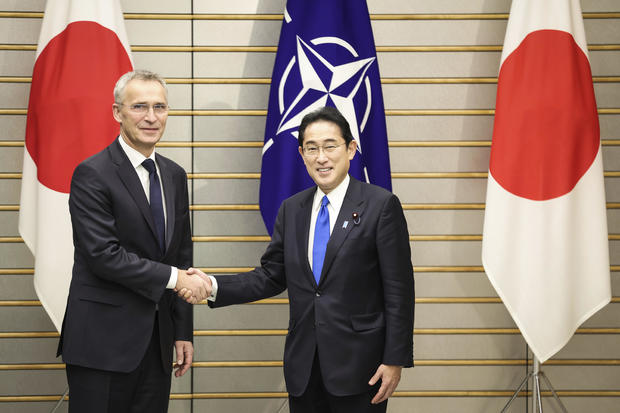Tokyo — China’s growing assertiveness and collaboration with Russia poses a threat not only to Asia but also to Europe, NATO Secretary-General Jens Stoltenberg said Wednesday as he sought stronger cooperation and more “friends” for NATO in the Indo-Pacific region. Stoltenberg said China is increasingly investing in nuclear weapons and long-range missiles without providing transparency or engaging in meaningful dialogue on arms control for atomic weapons, while escalating coercion of its neighbors and threats against Taiwan, the self-ruled island it claims as its own territory.
“The fact that Russia and China are coming closer and the significant investments by China and new advanced military capabilities just underlines that China poses a threat, poses a challenge also to NATO allies,” Stoltenberg told an audience at Keio University in Tokyo. “Security is not regional but global.”
“NATO needs to make sure we have friends,” he said. “It is important to work more closely with our partners in the Indo-Pacific.”
Calling it a “critical moment for NATO and for Japan,” Stoltenberg said China and Russia were “leading an authoritarian pushback against international rules-based order.”
Stoltenberg said a victory by Russian President Vladimir Putin in his war on Ukraine would send a message that authoritarian regimes can achieve their goals through brute force. “This is dangerous,” he said.
“China is watching closely and learning lessons that may influence its future decisions,” Stoltenberg said at a joint news conference with Japanese Prime Minister Fumio Kishida.
“China is substantially building up its military forces including nuclear weapons, bullying its neighbors and threatening Taiwan, trying to control critical infrastructure and spreading misinformation about NATO and the war in Ukraine,” Stoltenberg said. “China is not our adversary, but we must understand the scale of the challenge and work together to address it.”
He said the alliance would continue to engage with China in areas of common interest, such as climate change.
CBS News contributor General H.R. McMaster (Retired), who served as national security adviser to former President Trump, said recently that the U.S. military must “be ready” for a possible war with China. He was backing a memo that came from Air Force Gen. Mike Minihan, head of the U.S. Air Mobility Command, warning the U.S. and China could be at war within the next two years.
McMaster said Minihan’s remark was likely based on a “gut feeling that we’re in a period of increasing danger, and I think he’s right about that.” McMaster pointed specifically to Taiwanese elections scheduled for 2024, saying if China’s leadership “doesn’t see the outcome they want in Taiwan then, I think the chances go up.”
Most importantly, McMaster said, China’s leader Xi Jinping “has said he’s going to do it. You know, many of his speeches, he seems to be preparing the Chinese people for war, and of course, it’s our military’s job to be ready.”
Stoltenberg and Kishida held talks and agreed to step up their partnership in security in cyberspace, space, defense and other areas.
Besides Japan, NATO is also strengthening “practical cooperation” with Australia, New Zealand and South Korea in maritime cybersecurity and other areas and stepping up participation of their leaders and ministers in NATO meetings, he said.
Kishida on Tuesday announced Japan’s plans to open a representative office at NATO.
Japan, already a close ally of the United States, has in recent years expanded its military ties with other Indo-Pacific nations as well as with Britain, Europe and NATO amid growing security threats from China and North Korea.
Tokyo was quick to join in U.S.-led economic sanctions against Russia’s war in Ukraine and provided humanitarian aid and non-combative defense equipment for Ukrainians. Japan fears that Russian aggression in Europe could be reflected in Asia, where concerns are growing over increasing Chinese assertiveness and escalating tensions over its claim to Taiwan.
Takashi Aoyama/AP
Stoltenberg arrived in Japan late Monday from South Korea, where he called for Seoul to provide direct military support to Ukraine to help it fight off the prolonged Russian invasion.
North Korea condemned Stoltenberg’s visits to South Korea and Japan, saying that NATO was trying to put its “military boots in the region” to pressure America’s Asian allies into providing weapons to Ukraine.
North Korea also criticized increasing cooperation between NATO and U.S. allies in Asia as a process to create an “Asian version of NATO,” saying it would raise tensions in the region.
Stay connected with us on social media platform for instant update click here to join our Twitter, & Facebook
We are now on Telegram. Click here to join our channel (@TechiUpdate) and stay updated with the latest Technology headlines.
For all the latest Entertainment News Click Here

